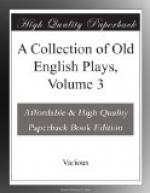Lew. The like doth Fraunce. Lovers,
imbrace your loves
And, Captaines, joyne your bands; mix power with power
And let those swords, which late were drawne for death,
Sleepe in their sheaths. You, worthy Pembrooke[155],
And all your followers, shall receyve our favours
In plenteous largesse. So, set on to Court;
Sound Drums and Trumpets, deafe the ayre with cryes,
And fill eche subjects heart with joyes increase
T’applaud our childrens love and this dayes
peace.
[Exeunt.
FINIS.
FOOTNOTES:
[1] 4tos. Will.
[2] References to the lapwing’s subtlety are very common. Cf. Shakesp., Measure for Measure, i. 4, 32, &c.
[3] An old game at cards; it is supposed to have resembled cribbage.
[4] “To make ready,” meaning “to dress,” is a very common expression in old authors.
[5] An obvious reference to Queen Elizabeth.
[6] So Elbow:—“My wife, Sir, whom I detest before heaven and your honour,” &c. (M. for M., II. 1).
[7] Ovid, Metamorph. I. 1.
[8] People who walk with mincing steps. I have not met the word elsewhere. (Cf. dancitive, p. 31.)
[9] A beggar (Ital. besogno) Vid. Dyce’s Glossary under “Besonian”.
[10] “Knight of the post” was the name given to those who gained their living by giving false evidence at law-courts. Nares quotes from Nash’s “Pierce Pennilesse":—“A knight of the post, quoth he, for so I am tearmed: a fellow that will swear any thing for twelve pence.”
[11] Cf. Lear, iii. 2. Vaunt-curriors to oak-cleaving thunder-bolts. (First folio.)
[12] “Division” was a technical term in music for “the running a simple strain into a great variety of shorter notes to the same modulation” (Nares). The “plain song” was the simple air without variations.
[13] Sir Thomas Overbury says, in his character of ‘A very woman,’ that ’her lightnesse gets her to swim at top of the table, where her wee little finger bewraies carving’.
[14] 4tos. Ladies.
[15] 4tos. Eternesses.
[16] To do anything with ‘a wet finger’ is to do it easily. ’It seems not very improbable that it alluded to the vulgar and very inelegant custom of wetting the finger to turn over a book with more ease.’—Nares.
[17] Ov. Metam. I., ll. 322-23.
[18] Ed. 1606, one; ed. 1636, on.
[19] The 1606 ed. marks “Exit” Penelope.
[20] Here Momford retires to the back of the stage, where Clarence is waiting. The 4tos. mark “Exit.” I thought the lines “Mens est,” etc., were Horace’s, but cannot find them. “Menternque” destroys sense and metre. An obvious correction would be “et nomen.”
[21] “Falsus honos juvat, et mendax
infamia terret
Quem, nisi mendosum
et medicandum.”
Hor.
Ep. l. 16, ll. 39, 40.




